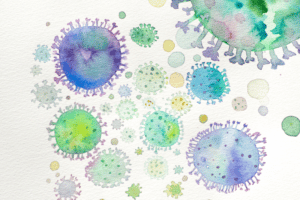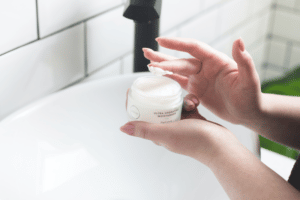Pediatric Nurse Week: Honoring Pediatric Nurses & How To Become One
Celebrate Pediatric Nurses Week as we talk about what pediatric nurses do, ideas for showing appreciation, and a breakdown of how to become one. Don’t miss this!
Hand washing is always a topic of conversation as a nurse. Whether you are telling your patient to wash their hands or you get the weekly reminder in the huddle to ensure proper hand hygiene practices, it is always being brought up somewhere.
But, have you ever wondered how many times during their shift a nurse washes their hands or uses hand sanitizer? Spoiler alert! It’s a lot!
Let’s talk about hand hygiene today including doing the math on how many times we perform hand hygiene, some shocking facts, and a few tips on how to take care of our hands.
As nurses, we are expected to perform hand hygiene before and after entering a patient’s room, before sterile procedures, after touching the patient’s environment with bare hands, when our hands are visibly soiled, and the list goes on! So it begs the question, just how many times per shift do nurses perform hand hygiene either with an alcohol-based sanitizer or soap and water?
Well, according to the CDC, “Healthcare providers might need to clean their hands as many as 100 times per 12-hour shift, depending on the number of patients and intensity of care.” Though we could leave it at that, let’s do some math and see how it adds up!
To set the scene, we’ll say that we are a Med/Surg nurse on a 12-hour long day shift caring for six stable patients who are not on isolation precautions and do not require any wound care or special procedures.
So, even if we have some simple patients, at the very least we will still need to give scheduled medications and do rounding every one to two hours since that is the standard level of care at most hospital facilities.
If each of our patients only has 10 a.m. medications (which is rare!), then we will start with performing hand hygiene a minimum of 12 times if it goes perfectly. We can then add on at least another 72 hand hygiene performances if we rounded on each of our patients just 6 times per shift leaving us already at 84 times we have either washed our hands or used sanitizer.
Now, we know that is only the bare minimum. Our patients likely have more meds scheduled throughout the shift and at least a few of them are going to need other care tasks, not including anything else that arises during your shift.
We would have to argue that the CDC’s estimate of performing hand hygiene 100 times during a 12-hour shift is actually more of a minimum amount.
Our calculations put us at 84 times basing it off an easy assignment. In reality, even if you have 3 patients in a Progressive Care Unit, instead of 6 on a Med/Surg, you are likely still to hit 100 on an easy shift because though the number of patients is less, the amount of times you have to be in and out of the room is higher due to acuity.

As if the hand hygiene count wasn’t shocking enough, here are some other shocking facts about hand hygiene!
Facts obtained from the CDC and Tri-County Healthcare System.

If we are washing or putting sanitizer on our hands as nurses at least 100 times per shift at the minimum and likely working three shifts per week, that is a lot of wear and tear!
When you don’t take care of your hands, they will end up dry and cracking which is painful especially when there is no way around using sanitizer or gloves over those cracked hands in your job.
Instead of letting them get to that point, we have some tips on how to take care of your hands as a nurse.
Of course, the number one tip is to moisturize as your life depends on it! We are not just talking about using a lotion that smells good every once in a while. You’re going to need a variety of lotions, creams, and moisturizers for different occasions.
For instance, you may want a quality lightweight, oil-free lotion to keep in your bag that you can apply a couple of times throughout the shift and intense hand cream that you can lather on before bed for deeper moisture.
No matter which products you decide to go with, always make sure they are alcohol-free because that will just dry your hands even more. Fragrances and parabens can also be drying so steering clear of those is a good idea as well.
Try to keep hand moisturizer with you at work, in your purse or car, and in several places throughout the house so that you actually remember to use it!
Though it is more time-consuming to wash your hands each time at the sink with soap and water versus just using a pump of sanitizer, it is better for your skin to go the soap route.
In your day if you have extra time here and there, skip the sanitizer and opt for classic handwashing in the sink. Over time, your hands will thank you for this simple switch.
What comes along with dry hands? Dry cuticles and fragile nails. Prevent pesky, painful hang nails by getting regular manicures.
No matter if you are male or female, keeping up with regular manicures just to keep your nails and cuticles healthy is essential. You can forgo the polish if you’d like, but let the manicurist work their magic on your hands at least once a month to keep them in good shape.
We all are in the habit of drying our hands as quickly as possible which usually means that we are rubbing the rough paper towel vigorously over our wet hands over and over.
Unfortunately, this causes extra dryness and irritates the skin, especially with how often we are doing it. Instead, take the bit of extra time it takes to pat your hands dry.
The powder inside some latex and nitrile gloves is meant to absorb the excess moisture from your hands so they don’t become wet in the glove.
However, that powder is still sucking up moisture from your hands even if there is no excess. Some people are also sensitive to it making their skin crack much easier.
If you have to wear powdered gloves for a certain task, consider double-gloving with a powder-free nitrile glove underneath.
Ultimately, we know hand hygiene is a force of nature against spreading germs which is why nurses have to clean their hands at least 100 times per shift. However, that also means that we are robbing our hands of moisture every time we use a squirt of sanitizer or head to the sink.
Though we can’t perform hand hygiene any less, we can still take care of our hands and replace that moisture just by adding the few things we talked about into our routines. After all, our hands are an important part of the job!
We want to hear from you! What do you do to take care of your hands as a nurse? Give us your best product recommendations and tips!
Author
most recent
Celebrate Pediatric Nurses Week as we talk about what pediatric nurses do, ideas for showing appreciation, and a breakdown of how to become one. Don’t miss this!
Ever wonder, what is with nurses and coffee? I mean, why do nurses love coffee? So many of us depend on that rich, hot java to jumpstart a shift.
Let’s look at the pros and cons of social media for nurses, and how we can successfully navigate the complexities and legalities of personal and professional life.
0 Comments